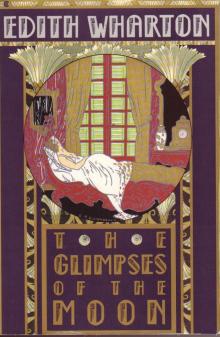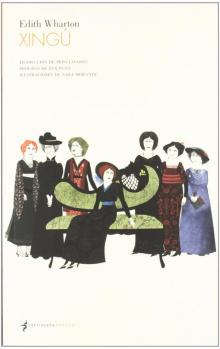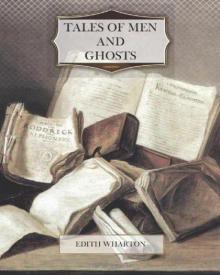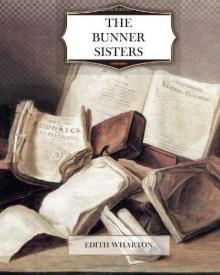- Home
- Edith Wharton
Other Times, Other Manners Page 3
Other Times, Other Manners Read online
Page 3
As she came forward, Mrs. Lidcote found herself humorously wondering whether she were mourning Horace Pursh's divorce in one of his mother's old black satins.
"Oh, did you mean to go down?" Susy Suffern peered at her, a little fluttered. "Leila sent me up to keep you company. She thought it would be cozier for you to have tea here. She was afraid you were feeling rather tired."
"I was; but I've had the whole afternoon to rest in. And this wonderful sofa to help me."
"Leila told me to tell you that she'd rush up for a minute before dinner, after everybody had arrived; but the train is always dreadfully late. She's in despair at not giving you a sitting- room; she wanted to know if I thought you really minded."
"Of course I don't mind. It's not like Leila to think I should." Mrs. Lidcote drew aside to make way for the housemaid, who appeared in the doorway, bearing a table spread with a studied variety of tea-cakes.
"Leila saw to it herself," Miss Suffern murmured as the door closed on the housemaid's efficient figure. "Her one idea is that you should feel happy here."
It struck Mrs. Lidcote as one more mark of the subverted state of things that her daughter's solicitude should find expression in the tenuity of sandwiches and the piping-hotness of muffins; but then everything that had happened since her arrival seemed to increase her confusion.
The note of a motor-horn down the drive gave another turn to her thoughts. "Are those the new arrivals already?" she asked.
"Oh, dear, no; they won't be here till after seven." Miss Suffern craned her head from the window to catch a glimpse of the motor. "It must be Charlotte leaving."
"Was it the little Wynn girl who was called away in a hurry just now? I hope it's not on account of illness."
"Oh, no; I believe there was some mistake about dates. Her mother telephoned her that she was expected at the Stepleys, at Fishkill, and she had to be rushed over to Albany to catch a train."
Mrs. Lidcote meditated. "I'm sorry. She's a charming young thing. I hoped I should have another talk with her this evening after dinner."
"Yes; it's too bad." Miss Suffern's gaze grew vague. "You do look tired, you know," she continued, seating herself at the tea-table and preparing to dispense its delicacies. "You must go straight back to your sofa and let me wait on you. The excitement has told on you more than you think, and you mustn't fight against it any longer. Just stay quietly up here and let yourself go. You'll have Leila to yourself on Monday."
Mrs. Lidcote received the tea-cup which her cousin proffered, but showed no other disposition to obey her injunctions. For a moment she stirred her tea in silence; then she asked, "Is it your idea that I should stay quietly up here till Monday?"
Miss Suffern set down her own cup with a gesture so sudden that it endangered an adjacent plate of scones. When she had assured herself of the safety of the scones, she looked up with a fluttered laugh. "Perhaps, dear, by to-morrow you'll be feeling differently. The air here, you know--"
"Yes, I know." Mrs. Lidcote bent forward to help herself to a scone. "Who's arriving this evening?" she then inquired.
Miss Suffern frowned and peered. "You know my wretched head for names. Leila told me, of course--but there are so many--"
"So many? She didn't tell me she expected a big party."
"Oh, not big: but rather outside of her little group. And of course, as it's the first time, she's a little excited at having the older set."
Mrs. Lidcote considered this. "The older set? Our contemporaries, you mean?"
"Why--yes." Miss Suffern paused as if to gather herself up for a leap. "The Ashton Gileses," she brought out.
"The Ashton Gileses? Really? I shall be glad to see Mary Giles again. It must be eighteen years," said Mrs. Lidcote, steadily.
"Yes," Miss Suffern gasped, precipitately refilling her cup.
"The Ashton Gileses; and who else?"
"Well, the Sam Fresbies. But the most important person, of course, is Mrs. Lorin Boulger."
"Mrs. Boulger? Leila didn't tell me she was coming."
"Didn't she? I suppose she forgot everything when she saw you. But really the party was got up for Mrs. Boulger. You see, it's very important that she should--well, take a fancy to Leila and Wilbour: his being appointed to Rome virtually depends on it. And you know Leila insists on Rome in order to be near you. So she asked Mary Giles, who's intimate with the Boulgers, if the visit couldn't possibly be arranged; and Mary's cable caught Mrs. Boulger at Cherbourg. She's to be only a fortnight in America; and getting her to come directly here was rather a triumph."
"Yes; I see it was," said Mrs. Lidcote.
"You know, she's rather--rather fussy; and Mary was a little doubtful if--"
"If she would, on account of Leila?" Mrs. Lidcote murmured.
"Well, yes. In her official position. But luckily she's a friend of the Barkleys. And finding the Gileses and Fresbies here will make it all right. The times have changed," Susy Suffern indulgently summed up.
Mrs. Lidcote smiled. "Yes; a few years ago it would have seemed improbable that I should ever again be dining with Mary Giles and Harriet Fresbie and Mrs. Lorin Boulger."
Miss Suffern did not at the moment seem disposed to enlarge upon this theme; and after an interval of silence Mrs. Lidcote suddenly resumed, "Do they know I'm here, by the way?"
The effect of her question was to produce in Miss Suffern an exaggerated access of peering and frowning. She twitched the tea- things about, fingered her bugles with a flurried hand, and, looking at the clock, exclaimed amazedly: "Mercy! Is it seven already?"
"Not that it can make any difference, I suppose," Mrs. Lidcote musingly continued. "But did Leila tell them I was coming?"
Miss Suffern looked at her with pain. "Why, you don't suppose, dearest, that Leila would do anything--"
Mrs. Lidcote went on: "For, of course, it's of the first importance, as you say, that Mrs. Lorin Boulger should be favorably impressed in order that Wilbour may have the best possible chance of getting Rome."
"I told Leila you'd feel that, dear. You see, it's actually on your account--so that they may get a post near you- -that Leila invited Mrs. Boulger."
"Yes, I see that, of course." Mrs. Lidcote, abruptly rising from her seat, turned her eyes to the clock. "But, as you say, it's getting late. Oughtn't we to dress for dinner?"
Miss Suffern, at the suggestion, stood up also, an agitated hand among her bugles. "I do wish I could persuade you to stay up here this evening. I'm sure Leila'd be happier if you would. Really, you're much too tired to come down."
"What nonsense, Susy!" Mrs. Lidcote spoke with a sudden sharpness, her hand stretched to the bell. "When do we dine? At half-past eight? Then I must really send you packing. At my age it takes time to dress."
Miss Suffern, thus decisively projected toward the threshold, lingered there to reiterate reproachfully: "Leila'll never forgive herself if you make an effort you're not up to." But Mrs. Lidcote smiled on her without answering, and the icy light-wave propelled her through the door.
V
MRS. LIDCOTE, though she had made the gesture of ringing for her maid, had not done so.
When the door closed, she stood a moment motionless in the middle of her soft, spacious room. The little fire which had been kindled at twilight danced on the brightness of silver and mirrors and sober gilding; and the sofa toward which Miss Suffern had urged her heaped up its accumulated cushions in inviting proximity to a table laden with new books and papers. She could not recall having ever been more luxuriously housed, or having ever had so strange a sense of being out alone, under the night, in a wind-beaten plain without shelter. She sat down by the fire and thought.
A tap on the door made her lift her head, and she saw her daughter on the threshold. The intricate ordering of Leila's fair hair and the contrasted negligence of her draperies showed that she had interrupted her dressing to hasten to her mother; but once in the room, she paused a moment, smiling uncertainly, as though she had forgotten the object of her hast
e.
Mrs. Lidcote rose to her feet. "Time to dress, dearest? Don't scold! I sha'n't be late," she said.
"To dress?" Leila hung before her with a puzzled look. "Why, I thought, dear--I mean, I hoped you'd decided just to stay here quietly and rest."
Her mother smiled. "But I've been resting all the afternoon!"
Leila shone on her apprehensively. "Yes, but--you know you do look tired. And when Susy told me just now that you meant to make the effort--"
"You came in to stop me?"
"I came in to tell you that you needn't feel in the least obliged--"
"Of course. I understand that."
There was a pause during which Leila, vaguely averting herself from her mother's scrutiny, drifted toward the dressing-table and began to disturb the symmetry of the toilet implements laid out on it.
"Do your visitors know that I'm here?" Mrs. Lidcote suddenly went on.
"Do they-- Of course--why, naturally," Leila rejoined, absorbed in trying to turn the stopper of a salts-bottle.
"Then won't they think it odd if I don't appear at dinner?"
"Oh, not in the least, dearest. Really, I assure you they'll all understand." Leila laid down the bottle and turned back to her mother, her face alight with reassurance.
Mrs. Lidcote stood motionless, her head erect, her smiling eyes on her daughter's. "Will they think it odd if I do?"
Leila stopped short, her lips half parted to reply. As she paused, the color stole over her bare neck, swept up to her throat, and burst into flame in her cheeks. Thence it sent its devastating crimson up to her very temples, to the lobes of her ears, to the edges of her eyelids, beating all over her in great waves of red, as if fanned by some imperceptible wind which blew back the words from her lips.
Mrs. Lidcote for a moment silently watched the conflagration; then she turned away her eyes with a slight laugh. "I only meant that I was afraid it might upset the arrangement of your dinner- table if I didn't, at the last, come down. If you can really assure me that it won't, I believe I'll take you at your word and go back to this irresistible sofa." She paused, as if waiting for her daughter to speak; then she held out her arms. "Run off and dress, dearest, and don't have me on your mind." She clasped Leila close, pressing a long kiss on the last afterglow of her subsiding blush. "I do feel the least bit overdone, and if it really won't inconvenience you to have me drop out of things, I believe I'll just basely take to my bed and stay there till your party scatters. And now run off, dear, or you'll be late; and make my excuses to them all."
VI
THE Barkleys' visitors had dispersed, and Mrs. Lidcote, completely restored by her two days' rest, found herself, on the following Monday, alone with her children and Miss Suffern.
There was a note of jubilation in the air, for the party had "gone off" so extraordinarily well, and so completely, as it appeared, to the satisfaction of Mrs. Lorin Boulger, that Wilbour's early appointment to Rome was almost to be counted on. So certain did this seem that the prospect of a prompt reunion mitigated the distress with which Leila learned of her mother's decision to return almost immediately to Italy. No one understood this decision: it seemed to Leila absolutely unintelligible that Mrs. Lidcote should not stay on with them till their own fate was fixed, and Wilbour handsomely echoed her astonishment.
"Why shouldn't you, as Leila says, wait here till we can all pack up and go together?"
Mrs. Lidcote smiled her gratitude with her refusal. "After all, it's not yet sure that you'll be packing up."
"Oh, you ought to have seen Wilbour with Mrs. Boulger," Leila triumphed.
"No, you ought to have seen Leila with her," Leila's husband exulted.
Miss Suffern enthusiastically appended, "I do think inviting Harriet Fresbie was a stroke of genius!"
"Oh, we'll be with you soon," Leila laughed. "So soon that it's really foolish to separate."
But Mrs. Lidcote held out with the quiet firmness which her daughter knew it was useless to oppose. After her long months in India, it was really imperative, she declared, that she should get back to Florence and see what was happening to her little place there; and she had been so comfortable on the Utopia that she had a fancy to return by the same ship. There was nothing for it, therefore, but to acquiesce in her decision and keep her with them till the afternoon before the day of the Utopia's sailing. This arrangement fitted in with certain projects which, during her two days' seclusion, Mrs. Lidcote had silently matured. It had become to her of the first importance to get away as soon as she could, and the little place in Florence, which held her past in every fold of its curtains and between every page of its books, seemed now to her the one spot where that past would be endurable to look upon.
She was not unhappy during the intervening days. The sight of Leila's well-being, the sense of Leila's tenderness, were, after all, what she had come for; and of these she had full measure. Leila had never been happier or more tender; and the contemplation of her bliss, and the enjoyment of her affection, were an absorbing occupation for her mother. But they were also a sharp strain on certain over-tightened chords, and Mrs. Lidcote, when at last she found herself alone in the New York hotel to which she had returned the night before embarking, had the feeling that she had just escaped with her life from the clutch of a giant hand.
She had refused to let her daughter come to town with her; she had even rejected Susy Suffern's ministrations. She wanted no viaticum but that of her own thoughts; and she let these come to her without shrinking from them as she sat in the same high-hung sitting-room in which, just a week before, she and Franklin Ide had had their memorable talk.
She had promised her friend to let him hear from her, but she had not done so. She knew that he had probably come back from Chicago, and that if he learned of her sudden decision to return to Italy it would be impossible for her not to see him before sailing; and as she wished above all things not to see him, she had kept silent, intending to send him a letter from the steamer.
There was no reason why she should wait till then to write it. The actual moment was more favorable, and the task, though not agreeable, would at least bridge over an hour of her lonely evening. She went up to the writing-table, drew out a sheet of paper, and began to write his name. And as she did so, the door opened, and he came in.
The words she met him with were the last she could have imagined herself saying when they had parted. "How in the world did you know that I was here?"
He caught her meaning in a flash. "You didn't want me to, then?" He stood looking at her. "I suppose I ought to have taken your silence as meaning that. But I happened to meet Mrs. Wynn, who is stopping here, and she asked me to dine with her and Charlotte, and Charlotte's young man. They told me they'd seen you arriving this afternoon, and I couldn't help coming up."
There was a pause between them, which Mrs. Lidcote at last surprisingly broke with the exclamation, "Ah, she did recognize me, then!"
"Recognize you?" He stared. "Why--"
"Oh, I saw she did, though she never moved an eyelid. I saw it by Charlotte's blush. The child has the prettiest blush. I saw that her mother wouldn't let her speak to me."
Ide put down his hat with an impatient laugh. "Hasn't Leila cured you of your delusions?"
She looked at him intently. "Then you don't think Margaret Wynn meant to cut me?"
"I think your ideas are absurd."
She paused for a perceptible moment without taking this up; then she said, at a tangent: "I'm sailing to-morrow early. I meant to write to you--there's the letter I'd begun."
Ide followed her gesture, and then turned his eyes back to her face. "You didn't mean to see me, then, or even to let me know that you were going till you'd left?"
"I felt it would be easier to explain to you in a letter--"
"What in God's name is there to explain?" She made no reply, and he pressed on: "It can't be that you're worried about Leila, for Charlotte Wynn told me she'd been there last week, and there was a big party arriving whe
n she left: Fresbies and Gileses, and Mrs. Lorin Boulger--all the board of examiners! If Leila has passed that, she's got her degree."
Mrs. Lidcote had dropped down into a corner of the sofa where she had sat during their talk of the week before. "I was stupid," she began abruptly. "I ought to have gone to Ridgefield with Susy. I didn't see till afterward that I was expected to."
"You were expected to?"
"Yes. Oh, it wasn't Leila's fault. She suffered--poor darling; she was distracted. But she'd asked her party before she knew I was arriving."
"Oh, as to that--" Ide drew a deep breath of relief. "I can understand that it must have annoyed her dreadfully not to have you to herself just at first. But, after all, you were among old friends or their children: the Gileses and Fresbies--and little Charlotte Wynn." He paused a moment before the last name, and scrutinized her hesitatingly. "Even if they came at the wrong time, you must have been glad to see them all at Leila's."
She gave him back his look with a faint smile. "I didn't see them," she replied.
"You didn't see them?"
"No. That is, excepting little Charlotte Wynn. That child is exquisite. We had a little talk before luncheon the day I arrived. But when her mother found out that I was staying in the house, she telephoned her to leave immediately, and so I didn't see her again."
The blood rushed suddenly to Ide's sallow face. "I don't know where you get such ideas!"
She pursued, as if she had not heard him: "Oh, and I saw Mary Giles for a minute, too. Susy Suffern brought her up to my room the last evening, after dinner, when all the others were at bridge. She meant it kindly--but it wasn't much use."
"But what were you doing in your room in the evening after dinner?"
"Why, you see, when I found out my mistake in coming,--how embarrassing it was for Leila, I mean,--I simply told her that I was very tired, and preferred to stay up-stairs till the party was over."

 The Age of Innocence
The Age of Innocence The Reef
The Reef Summer
Summer The Glimpses of the Moon
The Glimpses of the Moon Xingu
Xingu The Fruit of the Tree
The Fruit of the Tree Fast and Loose
Fast and Loose Artemis to Actaeon and Other Verse
Artemis to Actaeon and Other Verse The Line of Least Resistance
The Line of Least Resistance The Lamp of Psyche
The Lamp of Psyche The Reckoning
The Reckoning Afterward
Afterward The New York Stories of Edith Wharton
The New York Stories of Edith Wharton The 2014 Halloween Horrors Megapack
The 2014 Halloween Horrors Megapack 'Copy': A Dialogue
'Copy': A Dialogue The Recovery
The Recovery The Fulness of Life
The Fulness of Life Early Short Stories Vol. 1
Early Short Stories Vol. 1 Tales of Men and Ghosts
Tales of Men and Ghosts The House of the Dead Hand
The House of the Dead Hand That Good May Come
That Good May Come The Buccaneers
The Buccaneers Other Times, Other Manners
Other Times, Other Manners The Hermit and the Wild Woman
The Hermit and the Wild Woman Kerfol
Kerfol The Duchess at Prayer
The Duchess at Prayer Bunner Sisters
Bunner Sisters The Choice
The Choice Madame De Treymes
Madame De Treymes Ethan Frome, Summer, Bunner Sisters
Ethan Frome, Summer, Bunner Sisters In Morocco
In Morocco The Valley of Decision
The Valley of Decision Age of Innocence (Barnes & Noble Classics Series)
Age of Innocence (Barnes & Noble Classics Series) The Angel at the Grave
The Angel at the Grave April Showers
April Showers Sanctuary
Sanctuary The Bunner Sisters
The Bunner Sisters Mrs. Manstey's View
Mrs. Manstey's View Writing a War Story
Writing a War Story The Custom of the Country
The Custom of the Country In Trust
In Trust The Triumph of the Night
The Triumph of the Night The Hermit and the Wild Woman, and Other Stories
The Hermit and the Wild Woman, and Other Stories Roman Fever and Other Stories
Roman Fever and Other Stories The Mission of Jane
The Mission of Jane The Descent of Man and Other Stories
The Descent of Man and Other Stories Coming Home
Coming Home The Touchstone
The Touchstone Early Short Stories Vol. 2
Early Short Stories Vol. 2 Edith Wharton's Verse, 1879-1919, from various journals.
Edith Wharton's Verse, 1879-1919, from various journals.